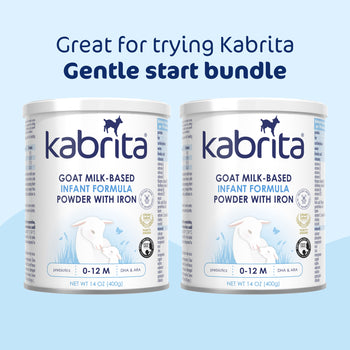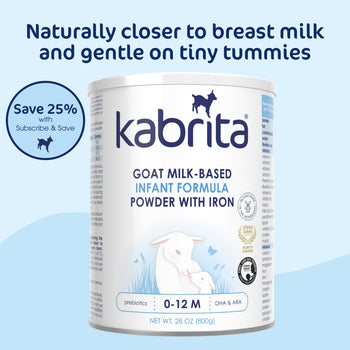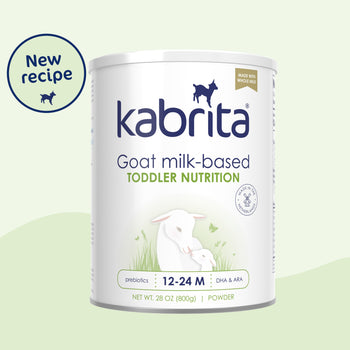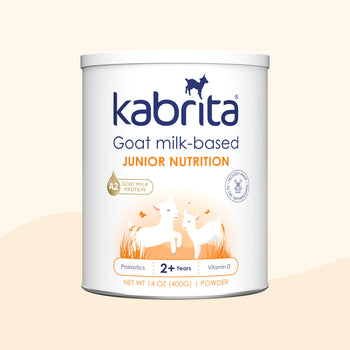What Is Goat Milk Formula? A Comprehensive Guide for Parents

By Jessica D'Argenio Waller, MS, CNS, LDN
When it comes to choosing a baby formula, the array of options can seem overwhelming. There are different paths to finding the best possible selection for your little one's growth and development. Cow milk has long been the standard base for infant formula, but goat milk-based formula has emerged as a nutrient-rich option that is more easily digested1 and structurally closer to breastmilk than traditional cow milk-based formulas,2 making it an ideal choice for many families.
But exactly what is goat milk-based formula? Consider this your intro to goat milk-based formula. We will include an overview of the benefits of this gentle option, share tips on how to transition to goat milk-based formula and detail what to look for when choosing a goat milk-based infant formula for your baby.
Table of Contents
Goat Milk Formula 101: Your Intro to Goat Formula
What to Know About Goat Milk Formula
Goat Milk Formula vs Cow’s Milk Formula (and Others!)
Frequently Asked Questions About Goat Milk Formula
Is Goat Milk Formula Right for Your Baby?
Goat milk-based formula 101: Your intro to goat formula
Goat milk-based formula is an infant formula that uses goat milk as its base. Naturally close in composition to breastmilk and gentle on little bellies, goat milk-based formula has been a much-loved choice across the world for over 200 years, explains Ari Brown, MD, FAAP, pediatrician, Chief Medical Advisor at Kabrita, and bestselling author of the "Baby 411" series.
"Both cow- and goat-milk based commercial infant formulas meet all the nutritional requirements for human babies. The reason why many families worldwide opt for a goat milk-based infant formula is that it is easier for babies to digest," says Dr. Brown. "Goat milk protein is naturally more similar to human milk protein, and as a result, babies have fewer issues with discomfort."
In recent years, more parents have been looking for gentle formulas that are easy on a baby's digestion, and many have turned to goat milk-based formulas as an alternative to cow's milk-based infant formulas. Goat milk-based formulas are growing in popularity thanks to their gentle protein profile and similarities to breastmilk.
Here's a quick look at the benefits of goat milk-based formula 101: We'll discuss these in greater detail below.
-
Goat milk proteins are smaller and softer than cow milk proteins; just the right shape and size for little ones to easily digest.3
-
Goat milk naturally contains prebiotics known as oligosaccharides, similar to breastmilk.4
-
Goat milk is naturally closer to breastmilk than other types of milk.5
The use of goat milk-based infant formula in a baby's first year of life is supported by the American Academy of Pediatrics (AAP) as a first-line alternative for when breastmilk is not an option or when formula supplementation is necessary. As for when to start? You can offer your baby a goat milk-based infant formula from day one.
Is regular goat milk safe for babies?
Plain, unmodified goat milk you might buy at the store or farmer's market is not suitable for infants under 1 year old, just as plain cow's milk is not appropriate either. "Unmodified, they contain an inappropriate amount of protein and lack essential vitamins and minerals that babies need to grow," says Dr. Brown. In infant formula, cow and goat milks are used as a base to which vitamins, minerals and fatty acids are added to ensure babies thrive, Dr. Brown explains.
It's also important to note that raw or unpasteurized goat milk (or any type of raw animal milk) is not safe for babies as it doesn't contain the specified amount of nutrients necessary to support growth in the first year—and could carry a risk of bacterial contamination, which may lead to serious illness. If you have questions about appropriate formula and feeding choices for your baby, check in with your child's pediatrician.
What to know about goat milk-based infant formula
"Goat milk based infant formula has been a popular parent choice around the globe for decades–for good reason," says Dr. Brown. Here are a few of the key benefits of goat milk formula.
1. Goat milk-based infant formula is gentle on sensitive stomachs
Thanks to its unique protein composition, goat milk is gentle on babies' developing digestive tracts.1 Goat milk contains low levels of alpha s1-casein proteins and high levels of A2 beta-casein proteins, which results in soft, loose curds in the stomach when digested and mixed with stomach acid.2 In contrast, cow's milk contains more alpha s1-casein and high levels of A1 proteins, which can create firmer, harder-to-digest curds that may cause digestive challenges in infants like gas, constipation, and fussiness.6
2. Goat milk-based infant formula is naturally closer to breastmilk than cow milk-based infant formula
Goat milk has a protein and fat profile more similar to breastmilk than traditional cow's milk. Its unique composition makes it more easily tolerated by some infants, with protein structures and key bioactive components that more closely mirror maternal milk. Notably, goat milk contains high levels of naturally occurring nucleotides—essential building blocks for RNA and DNA. Kabrita Goat Milk-Based Infant Formula has 4-5 times higher innately-occurring levels of nucleotides than cow milk-based formula.7 These nucleotides can play a crucial role in supporting an infant's rapid cellular development and immune system maturation.
3. Goat milk-based infant formula can supports gut health
"Goat milk naturally contains oligosaccharides, important prebiotics to help build and support the baby’s microbiome," says Dr. Brown. "Kabrita adds additional galacto-oligosaccharides (GOS) to their goat milk infant formula, because of the vital role they play in supporting both gut and immune health," she adds. GOS resemble the human milk oligosaccharides (HMOs) found in breastmilk and play a similar role.8
4. Goat milk-based infant formula can alleviate digestive discomfort
Research suggests that children who struggle with cow's milk-based products may tolerate goat milk-based products more successfully9, unless there's a diagnosis of cow's milk protein allergy (CMPA)—then goat milk-based infant formula is not recommended. While not allergen-free, goat milk formula's unique protein configuration can reduce the risk of immediate hypersensitivity reactions.10 Always consult with your pediatrician before introducing a goat milk formula if you're concerned that your child has CMPA.
Goat milk formula vs cow’s milk formula
Both goat milk-based formula and cow's milk-based formula are fortified to meet the nutritional needs of infants through the first year of life.11 Both are a good source of fat, protein and carbohydrates for growing babies. Based on the protein composition and naturally occuring bioactives, goat milk-based infant formula is naturally closer to breastmilk than cow milk-based infant formula, and studies show it's easier to digest, making it a good choice for sensitive tummies.
What is the difference between cow’s milk infant formula and goat’s milk infant formula?
There are several differences between cow's milk-based formulas and goat milk-based formulas.
Nutritional profile
While both formulas are meticulously designed to meet infant dietary needs, goat milk-based infant formulas offer certain nutritional advantages. One feature is their naturally high levels of oligosaccharides— prebiotics that play an important role in supporting infant gut health.4 In fact, goat milk contains these beneficial compounds at concentrations up to 5 times higher than those found in cow's milk, potentially providing enhanced digestive and immune system support for growing babies.12
Taste and palatability
Goat's milk-based infant formula typically has a creamy, mild and slightly sweeter taste as compared to cow's milk infant formula. Most infants accept goat milk-based formula willingly, and it should taste clean and fresh with no strong aftertaste.
Closer to breastmilk than cow milk-based infant formula
Goat milk-based infant formula offers a protein composition that is naturally closer to breastmilk as compared to cow milk-based infant formula, which also makes goat milk-based infant formula easier to digest than cow milk-based infant formulas.1 A protein digestion study showed that, after 2 hours, both breastmilk and goat milk-based infant formula were about 50% digested, while cow milk-based infant formula was only about 35% digested.1
FAQs about goat milk-based infant formula
Looking to learn more about goat milk-based infant formula? Here are answers to the most frequently asked questions.
Is goat milk infant formula FDA approved?
The FDA does not approve any infant formulas, however, all Infant formula products sold in the U.S., whether produced domestically or imported, must meet the strict U.S. FDA infant formula requirements. Currently, to sell an infant formula in the US, the product has to go through a rigorous FDA review process before getting the greenlight, or was part of the temporary enforcement discretion policy that President Biden put in place to help alleviate the infant formula shortage of 2022.
Kabrita's goat milk-based infant formula is FDA regulated—and in fact, it's the first and only European-made infant formula brand and only goat milk-based infant formula that has gone through the full FDA review process, ensuring strict FDA nutritional and safety standards are met. This ensures Kabrita's goat milk-based infant formula provides complete nutrition for an infant's first year of life, with designated levels of the 30 essential nutrients that must be included in infant formula.
Kabrita also adheres to stringent European Union infant formula standards for manufacturing and safety that strictly limit the use of antibiotics, growth hormones, and pesticides.
Why is goat milk-based infant formula more expensive?
Kabrita goat milk infant formula is priced similarly to cow’s milk infant formulas.
Can I switch my baby to goat milk-based infant formula?
"Goat milk-based infant formula is a great choice for many babies," says Dr. Brown. "It’s naturally gentle and easy for babies to digest and the AAP recommends it as a first-line nutritional option for a baby’s first year."
"If you're looking to transition to goat milk infant formula, it makes sense to incorporate one or two formula feedings a day and gradually add more, depending on if you plan to combo feed or wean your baby from breastmilk," Dr. Brown explains. Before switching to any new formula, connect with your child's pediatrician to discuss their recommendations for your little one, and then monitor your baby for any changes in feeding patterns during the transition.
Is goat milk-based infant formula better for babies?
Goat milk-based formula offers evidence-based benefits, such as easier digestibility and a protein profile more similar to breastmilk than cow milk-based infant formula. Of course, finding the best formula for your baby may take some trial and error, as babies respond differently to various formulas. What works best for your little one will ultimately depend on your baby's needs.
Is goat milk-based infant formula closer to breastmilk than cow milk-based infant formula?
While goat milk-based infant formula has lots in common with breastmilk, including similar protein structures and high levels of important nutrients like nucleotides, it is not identical to maternal milk. Nowadays, formulas are carefully fortified to mimic breastmilk's robust nutritional profile, but no infant formula can perfectly replicate the complex, dynamic composition of human breastmilk, which is bioactive, living food.
Why change to goat milk-based infant formula?
You might consider changing to goat milk-based infant formula if your baby is having digestive issues with cow's milk formula. Dr. Brown says to look for signs that an infant seems excessively fussy, spends several hours a day crying, is constantly spitting up, has constipation and/or eczema. If you notice these issues, speak to your child's pediatrician about making a formula switch.
"Kabrita is a great choice if a baby is on a cow milk-based infant formula and is fussy, uncomfortable, gassy, or constipated. These are often babies who are sensitive or have trouble tolerating cow milk protein and for many, these symptoms seem to improve when they use a goat milk based infant formula," says Dr. Brown. "This represents about 97% of all babies! The only time we cannot recommend Kabrita is for the 3% of babies with a true cow's milk protein allergy."
The gentler protein structure, potential for reduced allergic response, and nutritional profile make goat milk-based formula a strong alternative for some families seeking a different feeding option, but check in with your pediatrician first.
Is goat milk-based infant formula right for your baby?
With its gentle digestion properties, goat milk-based infant formula is a good option for many babies. And if your little one is not tolerating a traditional cow's milk infant formula, it's worth exploring goat milk-based infant formulas as an alternative. However, it's always best to chat with your child's pediatrician to determine the best new direction on your feeding journey.
Factors to consider and starter resources to finding the best goat milk-based formula
Thinking about using a gentle goat milk-based infant formula for your baby? Here are a few factors to consider.
Goat milk infant formula considerations
-
Digestive sensitivity: Consider goat milk-based formula if your baby experiences digestive discomfort with cow's milk infant formula, such as excessive gas, constipation, or fussiness. Goat milk's gentler protein structure and softer curds can potentially reduce these symptoms for many babies, and it's naturally closer in nutritional composition to breast milk than cow milk.
-
Nutritional needs: Evaluate your baby's specific nutritional requirements when determining if goat milk-based infant formula is right for you. While goat milk-based infant formula is fortified to meet infant dietary needs, each baby's response to formula can vary. Consulting with your pediatrician can help determine if this is the optimal choice for your child's growth and development.
-
Potential allergy concerns: If your baby has shown sensitivity to cow's milk proteins, goat milk infant formula might offer a more tolerable alternative. However, it's not appropriate for babies diagnosed with CMPA, so professional medical guidance is crucial before making any formula transitions.
Resources to find your baby’s best goat milk-based infant formula fit
-
Pediatrician consultation: Schedule a detailed discussion with your child's healthcare provider to review your baby's specific health profile and nutritional needs.
-
Trusted health sources: Explore reputable resources like the American Academy of Pediatrics (AAP) website for comprehensive, evidence-based information on infant formula options.
-
Lactation groups: Breastfeeding support groups led by a certified lactation consultant can be a good resource to get information on supplemental formulas that have worked well for other families, and how to use infant formula in combination with breastfeeding, if that's an option for you.
Every baby is unique—even within families—and finding the right infant formula is very much a journey. Goat milk-based infant formula is a gentle option that nourishes babies with a foundation supported by science and ingredients that are more similar to human milk than cow milk-based infant formulas—and is well-tolerated by many babies. But you know your baby best, says Dr. Brown. "You deserve to confidently feed your baby, without guilt or worry," she asserts. Trust your parental instincts and remember that your pediatrician is your most valuable partner in making these important nutritional decisions for your little one.
References
1 Maathuis A, et al. Protein digestion and quality of goat and cow milk infant formula and human milk under simulated infant conditions. J Pediatr Gastroenterol Nutr. 2017;65(6):661-666.
2 Park YW, Haenlein GFW. Handbook of milk of non-bovine mammals. 2nd ed. 2017, Ames, Iowa: Blackwell Pub.
3 Ceballos LS, et al. Composition of goat and cow milk produced under similar conditions and analyzed by identical methodology. J Food Composition Analysis. 2009;22(4):322-329.
4 van Leeuwen SS, et al. Goat milk oligosaccharides: their diversity, quantity, and functional properties in comparison to human milk oligosaccharides. J Agric Food Chem. 2020;68(47):13469-13485.
5 Pellis L, HT, and BH. Naturally high content of nucleotides in goat milk based infant formula. Poster presented at ESPGHAN, Geneva, Switzerland 2018.
6 Jakobsson I. Cow’s milk proteins cause infantile colic in breast-fed infants: a double-blind crossover study. Pediatrics. 1983;71(2):268-271
7 van der Toorn MV, Chatziioannou AC, Pellis L, Haandrikman A, van der Zee L, Dijkhuizen L. Biological Relevance of Goat Milk Oligosaccharides to Infant Health. J Agric Food Chem. 2023;71(38):13935-13949.doi:10.1021/acs.jafc.3c02194
8 Zuurveld M, et al. Immunomodulation by human milk oligosaccharides: the potential role in prevention of allergic diseases. Front Immunol. 2020;11:801.
9 Benjamin-van Aalst O, Dupont C, van der Zee L, Garssen J, Knipping K. Goat Milk Allergy and a Potential Role for Goat Milk in Cow's Milk Allergy. Nutrients. 2024;16(15):2402. doi:10.3390/nu16152402
10 Benjamin-van Aalst O, Dupont C, van der Zee L, Garssen J, Knipping K. Goat Milk Allergy and a Potential Role for Goat Milk in Cow's Milk Allergy. Nutrients. 2024;16(15):2402. Published 2024 Jul 24. doi:10.3390/nu16152402
11 ALKaisy QH, Al-Saadi JS, Al-Rikabi AKJ, Altemimi AB, Hesarinejad MA, Abedelmaksoud TG. Exploring the health benefits and functional properties of goat milk proteins. Food Sci Nutr. 2023;11(10):5641-5656. doi:10.1002/fsn3.3531
12 Martinez-Ferez A, et al. Goats’ milk as a natural source of lactose-derived oligosaccharides: isolation by membrane technology. Int Dairy J. 2006;16(2):173-181.



